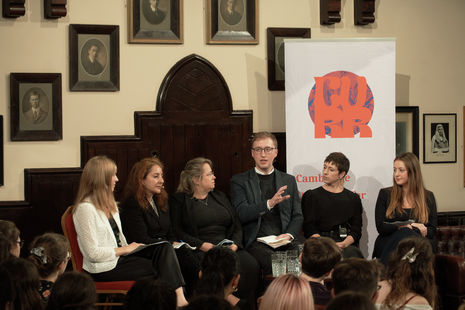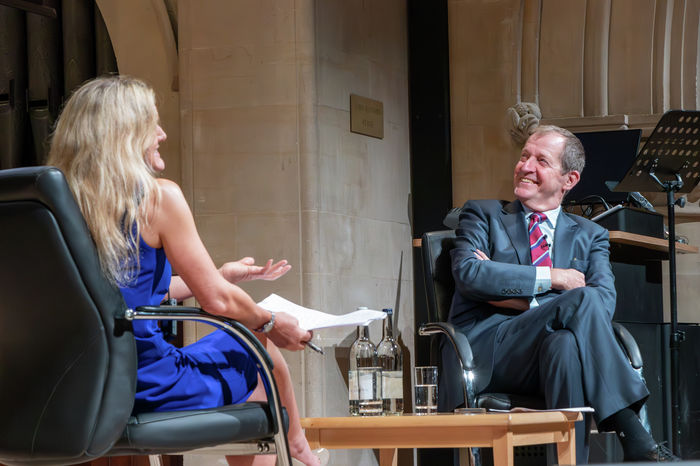CURR: the ‘special society’ giving a voice to all
Sam Hudson speaks with the founders of Cambridge University for Reproductive Rights about their inclusive space within divisive debates

For many, reproductive rights seem a secure thing in the UK. A chronic case of “America-brain” which has infected much of student politics on this side of the Atlantic only entrenches this perspective further. While fights over access to abortions play centre stage in presidential elections stateside, we like to take some solace in the idea that these rights are not a political bargaining chip on our more enlightened island.
The founders of CURR (Cambridge University for Reproductive Rights) believe this assessment is flawed. “I think because people think that it’s such settled legislation and that it’s such a non-issue, people can actually be quite poorly educated about why the UK’s legislation is the way it is,” says Laura Ryan, a former Neurobiology PhD student who co-founded the society alongside Helena Trenkić, a current History PhD student, and Emma Munday, a third-year Engineering student.
“There’s a chasm between the pro-choice majority and what happens in government”
Ryan points to recent Conservative attacks on sex education, such as Education Secretary Gillian Keegan’s recent posturing on “parental rights” to view the content of PSHE lessons, as an example where complacency has undermined reproductive rights in the UK. “The problem with sex education was that it was shit, not that it is excessive,” as Trenkić puts it more frankly, pointing to her own experiences with Britain’s lacklustre sex-ed curriculum that left her not knowing what menopause was when she arrived at Cambridge as an undergraduate.
For CURR, discussion about reproductive rights needs to be far more than just taking a side in the debate surrounding abortion legislation. While we may have more secure legislation in the UK, abortion access is still limited. Trenkić reminds me that abortion is still, in certain circumstances, criminalised in Britain. Other factors, such as infrastructure, further limit access to reproductive healthcare more broadly. Ryan pointed to her own experience living in Edinburgh where waiting lists for reproductive healthcare were “often weeks, verging on months”. “It’s just crazy how much quicker you get anything from Limetree clinic” in Cambridge. These differences are not due to any particularly active opposition to reproductive rights but instead political complacency. As Munday argues: “There’s a chasm between the pro-choice majority and what happens in government … just because a view is widely held that doesn’t mean it will be actioned in politics.”
“There is a space for wellness and community building … but there is definitely also a space for more proactive activism”
CURR came to be founded out of frustration at this complacency. A key moment for Trenkić was in 2019 when she wrote to the SU’s welfare officer asking them to help set up provision of period products around the University. The welfare officer suggested Trenkić submit a motion to the student council, forgetting that such a motion had already been passed the previous year with the SU doing nothing to act on it, instead being sidetracked by motions in solidarity with various countries and causes unconnected with Cambridge students. “We previously tried to reach out to draw attention to this cause and it wasn’t being picked up on … we felt that somebody needed to make a special society for it.” College FemSocs too had proved inadequate spaces for the type of activism that CURR wanted to focus on. All too often term cards are filled with “tote bag making” and other “self-care” orientated activities at the expense of activism. Ryan tells me: “There is a space for wellness and community building … but there is definitely also a space for more proactive activism like lobbying, fundraising, and speakers events … that’s what we felt was lacking in the feminist space in Cambridge.”
At the heart of the “hard activism” that CURR promotes is “consensus building” – prioritising support for reproductive rights over the factionalism and partisanship that can dog progressive movements. Trenkić points towards the united front which exists between the Evangelical and Catholic pro-life movements in the Anglosphere. “Religious differences fuelled most wars in human history. If they can come together, why can’t we?” Munday adds: “If we want to be good activists and genuinely make political change, we need to be as specific and targeted as the movement we’re trying to fight is.” CURR is open to all regardless of political or religious affiliation. Even though Munday, Trenkić, and Ryan are all members of the Liberal Association, they’re happy to count both socialists and Tories among their ranks. Ryan gave an example of a male member of the Conservative Association attending one of CURR’s pub meets with a friend. “In what world would it have been good activism to make him feel unwelcome?” As it turns out, they “ended up having a really nice conversation”.
“What kind of society do we live in where in oppression of your neighbour is not your problem?”
The presence of men within the reproductive rights movement was another thorny issue which we discussed. Ryan sees a “no uterus, no opinion” approach as fundamentally counterproductive to their coalition building project. “We don’t like that argument … what kind of society do we live in where oppression of your neighbour is not your problem?” Men are also affected more directly by access to contraception and sexual healthcare, Trenkić reminds me. Munday explains that “bodily integrity” and “personal liberty” underpin CURR’s support for reproductive rights. When these values are attacked, it “threatens everyone in society”.
Outside of their focus on political activism, CURR also wants to be able to help within Cambridge more directly. Pro-life groups are well organised in Cambridge and pose their own threats. Despite promising “unbiased information”, the charity which runs Cornerstone Pregnancy Advice Services is chaired by Reverend Mike Kendall, an evangelical pastor who has called abortion a “naked evil” on Twitter. To counter these more pernicious influences, Ryan tells me that CURR, in addition to putting together a webpage containing relevant resources, offers confidential support to students who find themselves in need of reproductive healthcare. “If anyone ever finds themselves in a situation where they need to go to an appointment, but don’t want to tell their friends … we would be more than happy to go with you.”
Is CURR the solution to the futility crisis which so often afflicts Cambridge politics? I certainly hope so. The targeted and focused “hard activism” of CURR seems to offer a concrete alternative to the disorganised, frenetic mush of “promise-everything-do-nothing” student activism. If only they could pay attention to CURR long enough …
 News / Report suggests Cambridge the hardest place to get a first in the country23 January 2026
News / Report suggests Cambridge the hardest place to get a first in the country23 January 2026 News / Reform candidate retracts claim of being Cambridge alum 26 January 2026
News / Reform candidate retracts claim of being Cambridge alum 26 January 2026 News / Cambridge ranks in the top ten for every subject area in 202623 January 2026
News / Cambridge ranks in the top ten for every subject area in 202623 January 2026 Comment / Cambridge has already become complacent on class23 January 2026
Comment / Cambridge has already become complacent on class23 January 2026 News / Palestine activists project slogans onto John’s24 January 2026
News / Palestine activists project slogans onto John’s24 January 2026










